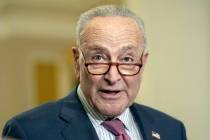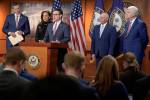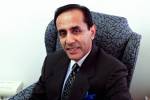Give ’em health, Harry, in terms we can understand
Several months into his presidency, Harry Truman stood before the American people and presented a bold legislative proposal to improve the nation's medical system and make health insurance available to the masses.
"Everyone should have ready access to all necessary medical, hospital and related services," Truman said. "I recommend solving the basic problem by distributing the costs through expansion of our existing compulsory social insurance system. This is not socialized medicine."
It was Nov. 19, 1945.
What happened next might sound familiar. According to the Truman Library Web site, "The American Medical Association (AMA) launched a spirited attack against the bill, capitalizing on fears of Communism in the public mind. The AMA characterized the bill as 'socialized medicine,' and in a forerunner to the rhetoric of the McCarthy era, called Truman White House staffers 'followers of the Moscow party line.'"
Nowadays, the plan of "Give 'Em Hell Harry" would be labeled "TrumanCare" and vilified as a plot to undermine the Republic. The idea of providing health care for the American working and middle classes is not new. Neither is the vilification.
Back then, Truman had a decision to make. He believed strongly in health insurance for all and in reforming the system, but he also had limited time and other pressing issues. In an analysis of Truman's speeches, Brian Hensel found the president passed up many opportunities to campaign for health reform. Truman regretted his failure the rest of his days.
"I have had some bitter disappointments as president," he recalled in 1956, "but the one that has troubled me most, in a personal way, has been the failure to defeat organized opposition to a national compulsory health-insurance program."
Fast forward to this past week, when I listened to a conference call in which Senate Majority Leader Harry Reid's policy experts answered health care reform questions from columnists around the country. At the risk of his political career, he has stepped in front of President Barack Obama on this issue to fight for the legislation that bears Reid's name.
I came away convinced of a couple things: First, Reid and his troops have worked very hard on this legislation, weaving ideas from many players in a sincere attempt to craft a bill that has a chance of passage while reforming a broken system. Second, not even the policy experts are terribly persuasive when it comes to making their cost analysis sound convincing.
While the nonpartisan Congressional Budget Office says the legislation will cut the deficit by $127 billion, I'm not convinced taxing high-end "Cadillac" health insurance policies will remain a stable revenue source. While I was assured safeguards are in place, it's easy to imagine the clever will opt out of high-end plans and divert the difference into savings accounts.
There are big questions about whether "promoting healthy lifestyles" will work in a fast-food culture. Like Congress, Americans hate to tighten their belts.
And if illegal immigrants will be denied insurance access, but substantial immigration reform won't be debated until 2010, who can say what the fiscal impacts will be?
The complex health care debate is easy to demagogue, and Reid and his allies eventually may decide half a loaf is better than none. But to avoid the fate of TrumanCare, Reid's soldiers must work harder to reach people with a series of clear, simple, accurate messages with the theme, "Give 'em health, Harry."
It's corny, sure, but it will be remembered long after the policy wonks and opinion-makers have quit mumbling. It might even get Reid re-elected in a state that views him and his fellow Democrats with mounting skepticism.
Harry Reid should start in his own backyard, and he might just help Harry Truman's dream come true.
John L. Smith's column appears Sunday, Tuesday, Wednesday and Friday. E-mail him at Smith@reviewjournal.com or call 702-383-0295. He also blogs at lvrj.com/blogs/smith.























